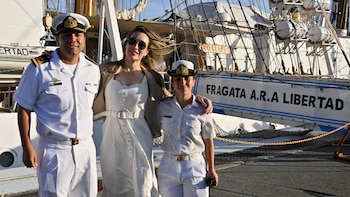
Halfway through the Games, let’s look at the Olympics as the original peace-through-sport movement. Today, does its idealistic halo control international conflict, invasions, and indifference to human suffering?
During the Olympic season, we see goodwill on display between nations – even among some enemies. The Games provide a cover for foes to walk the same walk in public, and even talk the same talk. The United Nations agreed again on an Olympic Truce enabling all to travel and participate safely at the Games to make the world a better place.
So, how is the Truce working for these XXXI Games of the Olympiad?
Here’s a running list. To bring people together, Brazil dropped visa requirements for the Games. Global transportation systems deployed well. The new airport, roadways and subway are bearing the weight of arrivals. Security teams of various types are visible and plentiful. The parade of athletes at the Opening Ceremony, the most famous movement in the Movement, went smoothly. Impressively, a new path was walked by new players – the first-ever team of refugees.
And when they passed, each one they passed said yeah.
Again the Olympic Truce shows that borders can be crossed even though foreign governments might be crossed.
What about life in the park? In ancient times, no weapons were to enter the sacred Olympian grove of competition. Today in Rio, the Olympic Village is secure while at the same time homelike. The athletes are signing the traditional Truce Wall. The venues have efficient screening systems in place. Yes, outside the fence big city problems continue, including a mugging on Copacabana Beach of a judoka medalist, no less. The UN flag flies along the others. Public health officials seek a virus-free Games by fogging with insecticide. Police action to explode questionable packages lying around is both concerning yet reassuring. Whether these Games are impermeable or merely dodging bullets will be discussed. So far, Rio hospitality remains determined and buoyant, regardless of political, economic, and social undertows unforeseen by planners seven years ago.
The Olympic Truce is for safe passage and participation at the Games. The Truce is not merely part of the Olympics, rather, it is the point of the Olympics. The Truce started the Games in 776 B.C. since making participation happen. By securing personal safety amidst foes, it defends the interests of the athletes (their mortal survival, no less), and the Truce defends the games more generally, for what if there were a Games and nobody showed up?
So far these Games, no country has invaded another, as happened during Beijing and Sochi. South Sudan overcame conflict to field its first team. Russia and Ukraine have kept their animosities off camera.
[SIDEBAR: Let’s start using the Olympic Truce within states, in addition to between them, to bind communities and hearts.]
Yes, wars continue, but note that conflicts between states are at historic lows. It is conflicts within states that write the headlines. Increasingly, extremists, civil war militants, and terrorists attack society from within. The effects are spreading beyond borders, destabilizing regions, and appearing as refugees on our doorsteps in ways unexpected for which we are unprepared. Essentially, we need to start using the Olympic Truce within states - in addition to between them - in order to bind communities and hearts.
Fortunately, the Truce’s ancient spirit is going there. Rio’s crime-ridden Morro dos Parezes favela made its own truce for change, and it is now over 70 days without police-gang gun violence. Further, young Rafaela Silva, surrounded by favela violence all her life, triumphed over adversity to win gold in judo last week. And most notably the refugee team has become everyone’s second home team, drawing heartfelt cheers while negotiating the balance beam between past and future.
So, statesmen and scholars miss the point of the Olympic Truce by sneering that it does not deliver world peace overnight. Instead, those on the grass-rooted path to and from the Games accurately reveal the force of the Movement by arriving safely, playing fairly, and inspiring their communities to improve through sport. Let’s use the Games’ opportunity for understanding - over lunch in the Olympic village, overseas among countries, and over our lives at home - to build a better world.
Hugh Dugan helped revive the ancient Olympic Truce at the United Nations and now heads the Truce Foundation of the USA. www.trucefoundation.us and @olympictruce
Últimas Noticias
Utah’s Olympic venues an integral part of the equation as Salt Lake City seeks a Winter Games encore
Utah Olympic Legacy Foundation chief of sport development Luke Bodensteiner says there is a “real urgency to make this happen in 2030”. He discusses the mission of the non-profit organization, the legacy from the 2002 Winter Games and future ambitions.

IOC president tells Olympic Movement “we will again have safe and secure Olympic Games” in Beijing
Thomas Bach, in an open letter on Friday, also thanked stakeholders for their “unprecedented” efforts to make Tokyo 2020 a success despite the pandemic.

Boxing’s place in the Olympics remains in peril as IOC still unhappy with the state of AIBA’s reform efforts
The IOC says issues concerning governance, finance, and refereeing and judging must be sorted out to its satisfaction. AIBA says it’s confident that will happen and the federation will be reinstated.

IOC president details Olympic community efforts to get Afghans out of danger after Taliban return to power
Thomas Bach says the Afghanistan NOC remains under IOC recognition, noting that the current leadership was democratically elected in 2019. But he says the IOC will be monitoring what happens in the future. The story had been revealed on August 31 in an article by Miguel Hernandez in Around the Rings

North Korea suspended by IOC for failing to participate in Tokyo though its athletes could still take part in Beijing 2022
Playbooks for Beijing 2022 will ”most likely” be released in October, according to IOC President Thomas Bach.




